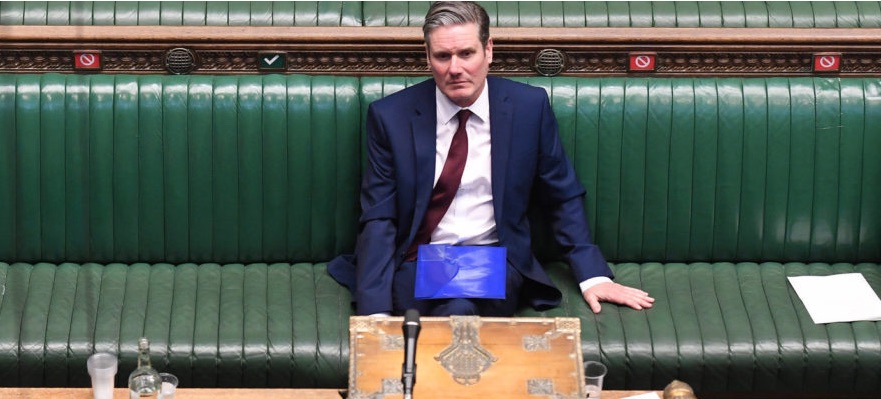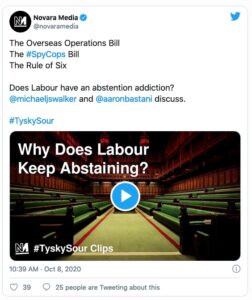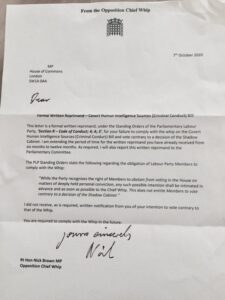Labour: the Party machine cracks down

JVL Introduction
So this is the leader of the opposition who stood on a programme of “uniting the Party”?
Starmer’s Labour Party is showing a level of intolerance not seen since the Blair days.
In some ways it is worse, given the conciliatory image Starmer projected which swung many moderate left supporters to give him a chance.
Well, he is using it. With a vengeance.
As Rivkah Brown and Aaron Bastani note, Starmer’s favoured refrain is that he is “putting the government on notice”.
Yet the only people he appears actually to be threatening are his own MPs.
This article was originally published by Novara Media on Fri 16 Oct 2020. Read the original here.
Keir Starmer Has Launched an Unprecedented Crackdown on Rebel MPs
As dissent mounts on Labour’s front and backbenches, Keir Starmer is cracking down on rebel MPs, with formal reprimands issued for infractions as minor as breaking a one-line whip.
Novara understands that all of the MPs who defied the whip on the overseas operations bill and the covert human intelligence sources bill (CHIS), also known as the spycops bill – both of which the party whipped to abstain on – immediately received letters from opposition chief whip Nick Brown.
The letters break significantly with party protocol. A one-line whip is the least strict instruction on how to vote, often considered advisory or non-binding, compared to tougher two or three-line whips. According to Labour’s standing orders, “minor breaches” by MPs should first be met with a verbal warning from the whips’ office. If a member continues to vote against the party, this should be escalated to a verbal warning from the chief whip. Only after these two steps have been taken would MPs usually receive a written reprimand. “They’ve gone straight for the harshest steps,” said one letter recipient. “It’s really heavy-handed.”
A spokesperson for the whips’ office said: “Whipping matters are between the chief whip and individual members of the parliamentary Labour party, who are all treated consistently. We do not make public comment on these matters.” The leader’s office did not respond when approached for comment.
The letters stipulate a reprimand period of six months, to be extended to twelve if the recipient continues to break the whip. They have been shared with Labour’s parliamentary committee – a group of backbench MPs elected by the parliamentary Labour party (PLP), and currently dominated by the right – which will determine whether to inform the MP’s constituency Labour party (CLP), as well as the party’s national executive committee (NEC). This information could then be considered when an MP seeks reselection ahead of a general election. “That’s the fear factor,” one MP told Novara Media. “This could impact your reselection [and] it might be over a one-line whip. It’s intimidation plain and simple.” A number of those who received letters are seeking legal advice from union representatives, the MP added.
Several MPs who spoke to Novara Media insisted that while they valued party discipline – “nobody becomes a Labour MP to rebel,” said one – they felt the spy cops and overseas bills presented them with little alternative. “I don’t want to be a serial whip-breaker, lots of us don’t,” said another MP, “but this is around really serious issues”.
However, some MPs told Novara Media that the reprimand letters had made them cautious about voting with their conscience in future; having the whip withdrawn was not an inconceivable consequence of breaking it. One MP speculated that “many more would have voted against the [spy cops and overseas] bills but didn’t, because of the threats”.

Such behaviour from the whips’ office appears unprecedented. “I don’t recall this scale of operation before,” one longstanding Labour member told Novara Media, “even under Mr Blair”. The MP compared this with the whips’ softer strategy during last year’s pivotal votes on the EU Withdrawal Bill: “Over Brexit, Nick Brown would say, ‘I want to maintain unity, I’m using a light touch’. People would get away with far worse than anything happening now.”
Indeed, the letters struck one veteran MP as hypocritical given Starmer’s own record of toeing the party line. “Starmer’s [conference] speech in 2018 [in which he insisted ‘campaigning for a public vote must be an option’ in any second referendum, despite this not being the policy of the shadow cabinet] was an act of gross disloyalty. Now he wants people to be punished for minor examples by comparison.”
A source close to the former leadership remarked that this alignment between the leader’s and whips’ offices represents a marked shift from the time of the Brexit votes: “They [the whips’ office] were opaque and PV [People’s Vote]-ish… indeed they operated autonomously from the leader’s office.” It was during these votes, the source added, that “the whips’ office and Keir’s team worked closely… the relationship between them now looks extremely tight”.
Several MPs believe that the whips’ newfound authoritarianism has been authorised by Starmer in the hopes of preventing the rebelliousness his predecessor faced, culminating in the attempted coup of 2016. “Perhaps the PLP was too rebellious under Jeremy,” speculated one former leader’s office staffer, “and they [Starmer’s office] want to run a tighter ship”. Yet with a number of MPs resigning from the opposition frontbench on Thursday in order to vote against the spy cops bill, it is unclear whether this tactic will prove effective in quelling factionalism or will simply inflame it.

To some, the letters escalate an ongoing campaign by the leadership against the party left, epitomised by the dismissal of Rebecca Long-Bailey earlier this year. These same people note that no disciplinary action has been taken against the chair of the Women’s PLP, Rosie Duffield, for her repeated comments regarding trans people – despite mounting criticism.
Keir Starmer’s favoured refrain is that he is “putting the government on notice”. Yet while the leader instructs his party to abstain on important votes, the only people he appears to be threatening are his own MPs – particularly those voting against the government.
Rivkah Brown is a writer and the editor of Vashti.
Aaron Bastani is a Novara Media contributing editor and co-founder.


Voting/abstaining against a leader’s diktat is not ‘voting against the party’; there is too much loose talk of this sort. MPs and especially ‘leaders’ have grossly swollen senses of entitlement; annual reselections would trim their egos (and wallets ) appreciably and actually defend them against such heavy-handed interventions by party bureaucrats as are mentioned. The lack of any party programme – deliberately avoided by KS – gives a leader carte blanche to manoeuvre to please the billionaire press (and finance capital); its absence deprives members and those MPs who have any spine of a reliable and publicly available standard by which to hold leaders and other MPs to socialist principles. LLA candidates will be sympathetic to such structures. If you want to vote for capitalism with an occasional charitable face, LtW will suit you – and perhaps your shareholdings and property investments fine. Socialism and a measure of democracy as above point in the opposite direction.
As for Duffield, I wrote to her complaining about a comment she made about my friend and fellow member calling him ‘an old man’. Considering both he and I had been committed socialists and party supporters for decades I found the comment belittling and ignorant. We strive against racism and sexism why must she descend into the one last bastion of bigitry…..agism?
I agree with rc’s view on Mr Starmer. I would like to add that whatever campaigning is expected to happen, there is not much to campaign with and for. I for one would class it as dishonest towards people to tell them that they can trust him and a government he hopes to lead, when everything shouts out loud and clear that this is not the case. He has reneged on his pledges/points he promised to get elected. What difference is there between him and the tories I ask.
We must be realistic! It has been obvious to me that from his first actions Mr Starmer was not going to be at ease with some concepts of either socialism or democracy. It is pointless to complain when Mr Starmer behaves in a way that is a departure of everything that we are accustomed to expect from a Labour leader.
One can only speculate as to who, or what, Mr Starmer owes his allegiance.
Mrs Sabine Ebert-Forbes asks what difference is there between Mr Starmer and the tories. We might await with bated breath for Mr Starmer to reveal how his policies depart in any substantial way from those of Mr Johnson! It would appear that those two gentlemen share a commitment to “market forces”. When might we expect a similar commitment from either of them to do what they were elected for– to act in the best interests of the British people?
What we know from New Labour is its a race to the bottom with cheap and nasty Tory party, between them they doubled the prison population
New Labour also lost 5 million votes between 97 and 2010
There is no difference between Red Tories, Blue Tories, Yellow Tories or Tartan Tories
Throw in Starmers fatal 2nd referendum support and its not looking good for any change any time soon
Need Class Action to succeed and internal report to clear them out